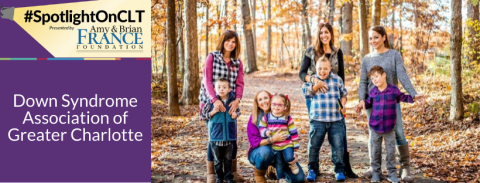#SpotlightOnCLT: Down Syndrome Association of Greater Charlotte
“How do you connect with a mom when you’re feeling like, ‘I'm upset about having a baby like yours?’” she asked me. “Good point,” I thought to myself, and Shana Filkins continued to reflect on her first days after receiving a Down syndrome diagnosis for her daughter in utero. Five years ago Shana knew only one family who had a child with Down syndrome, and for two long months she contemplated and rehearsed the call she knew she needed to make to them.
“It was devastating to me. I was 38 when I got pregnant. It was a dream come true - truly blissful because it took a long time to get pregnant and after receiving the Down syndrome diagnosis, I was ashamed and felt alone, ‘How could I be thinking this’ I thought to myself, ‘after wanting a baby for so long?’”
Five years later, Shana now connects families through the Down Syndrome Association of Greater Charlotte’s (DSA-GC) First Call Program. She is parents’ first point of contact when they reach out after receiving prenatal tests that confirm or discover that their child has Down syndrome. The DSA-GC is a connection point, a mama-tribe --with accurate, up-to-date information offering the opportunity to speak with a parent through the First Call Program.
The DSA-GC’s First Call program is a volunteer group of trained mentors available 24/7 to listen, share, answer questions, and provide valuable information. There is also D.A.D.S (Dads Appreciating Down syndrome) support group for fathers.
This mentor connection begins with a call or an online request, and DSA-GC Board Member, Shana Filkins, and mother to Taylor-Swift-loving 5-year-old Zoey who also has Down syndrome, responds and connects trained families who have also experienced a Down syndrome diagnosis.
Malikah Hodo reached out to DSA-GC’s First Call Program in August 2019 after being flooded with information from her maternal fetal medicine physician about all of the hurdles Down syndrome could cause her and her family. On the initial First Call phone call, Malikah and Shana talked for three hours, Shana answering question after question.
“You can get in a bubble and feel alone and scared, and it can be very scary to hear there is a genetic situation. My husband and I did not know a family or friend who had a child that had special needs before. It just really helps to connect. I cannot tell you how much a family we have gained at the DSA-GC, how open-armed people have been. Shana was honest and direct about her experience, not trying to convince or sugar coat anything, and I became more prepared after that phone call more than with all the Googling and maternal fetal medicine appointments,” Malikah gratefully explained.
The Internet often dehumanizes the prenatal diagnosis of a baby and floods new parents with information before they are ready, and an Internet search, as Malikah put it, is even worse.
“I would tell [parents who just received a prenatal diagnosis of Down syndrome] to stay off the Internet, not worry yourself with everything that is published. Everyone's experience is different - that caused more anxiety than what it was worth for me. Secondly, I would advise to utilize the resources like GiGi's Playhouse and DSA-GC. DSA-GC is a wealth of information and resources that I took back to my OB to have them share. My OB was encouraged with the information because he wanted to provide resources to other families.
The DSA-GC’s First Call program allows families with shared experiences to first grieve this unexpected news in a safe place while understanding one another’s situations without judgment but with understanding. The First Call group allows families to see how other families navigate the health concerns (often heart surgeries early-on), therapy, parenting a child with different needs than initially anticipated, and connects families with resources. Seeing another family living with their child with Down syndrome allows a First Call family with a prenatal diagnosis to visualize how their family is about to change. As Shana put it, there’s a lot of the same hurdles parenting in general brings to see and learn about as well as other difficulties having an extra chromosome brings.
Often people receive prenatal diagnosis before they are even connected with their baby, and it is really a diagnosis only.
As Shana explained to me, “This means the diagnosis is often unconnected to an actual person and very scary because you really only get data and statistics when you Google ‘Down syndrome’.”
Therefore, a vital piece the DSA-GC is revitalizing is their Medical Outreach program where they share resources and communication styles with medical professionals, specifically physicians, who often deliver the prenatal diagnosis to families. The goal of the Medical Outreach program is to help physicians with better phrasing of information, reminding them and the parents they are talking about a baby and also teach how to deliver the Down syndrome diagnosis in a more neutral manner.
If you are a Charlottean with healthcare or continuing medical education expertise, DSA-GC needs your help to help teach physicians across the Greater Charlotte area or if you know of a family who may want to connect through the First Call program, please direct them to Down Syndrome Association of Greater Charlotte where they can find other mentor families who can answer questions in a judgement-free zone, connect them to resources and support them along this new parenting journey.
DID YOU KNOW: Down Syndrome Association of Greater Charlotte is in the running to win $5K this month thanks to the Amy and Brian France Foundation who have partnered with SHARE Charlotte for this year’s Spotlight Series and YOU can help when you VOTE NOW! You can also check out the other organizations eligible to win this month’s prize, here!




